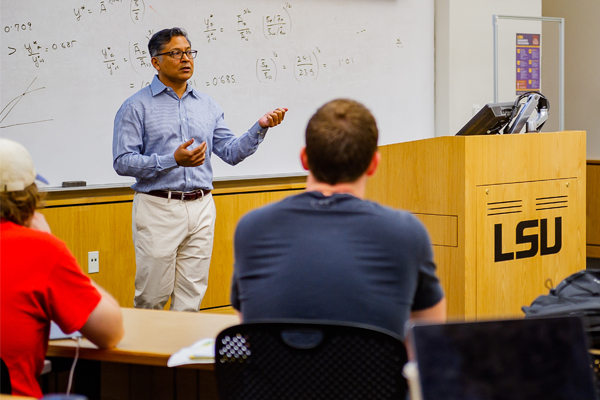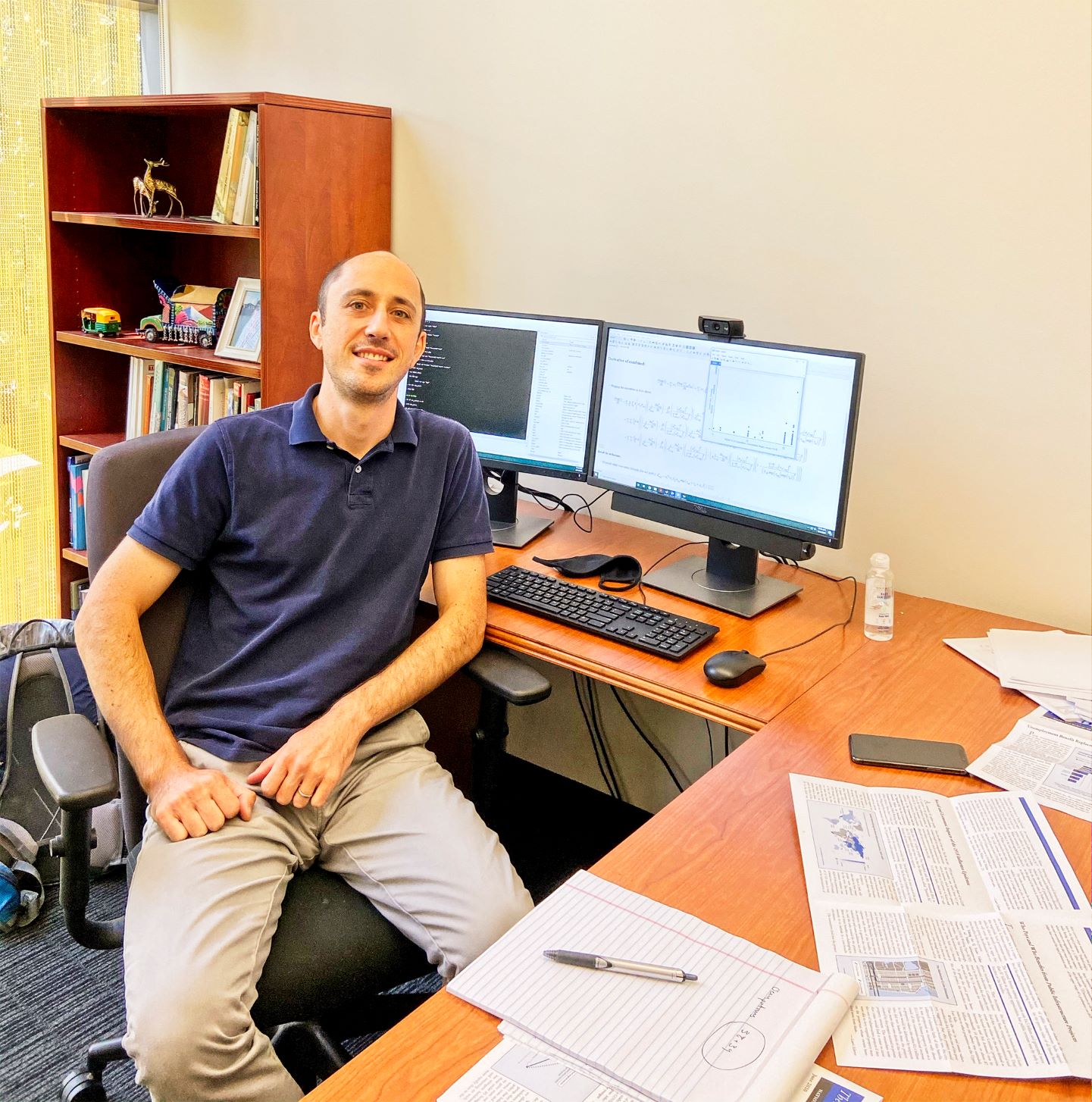Applicants for graduate studies in economics must meet the requirements for admission
to the Pinkie Gordon Lane Graduate School and be accepted by the Department of Economics.
Detailed information can be found in the admission requirements section on the Pink
Gordon Lane Graduate School's website. Please note that meeting the Pinkie Gordon
Lane Graduate School requirements and those specific to the Department of Economics
does not guarantee admission.
The economics department has the following requirements. Applications must be made
by February 1. Note that this date replaces the January 1 priority date for financial
assistance listed on the Pinkie Gordon Lane Graduate School website.
- GPA should be at least 3.0 (A=4.0)
- GRE: Those who are accepted usually have a minimum GRE score of 300, and at least
a score of 160 on the quantitative section.
- TOEFL/IELTS/PTE: A minimum TOEFL score of 80 (internet-based exam) or 213 (computer-
based exam); or a minimum score of 6.5 on the IELTS; or a minimum score of 59 on the
PTE is required for international students.
- References: Three letters of recommendation should be submitted. At least two letters
should be from your professors.
- Statement of Purpose: Two-page summary of your purpose for applying to the PhD program.
- Application Fee: This fee is charged by the graduate school, and thus cannot be waived
by the department.
It is preferable for students interested in pursuing the PhD degree to take calculus,
statistics, and intermediate macroeconomics and microeconomics before entering the
PhD program.
First Year
Fall
| Course |
Hours |
| ECON 7718 — Advanced Macroeconomics I |
3 |
| ECON 7702 — Advanced Microeconomics I |
3 |
| ECON 7630 — Econometric Methods I |
3 |
Spring
| Course |
Hours |
| ECON 7719 — Advanced Macroeconomics II |
3 |
| ECON 7703 — Advanced Microeconomics II |
3 |
| ECON 7631 — Econometric Methods II |
3 |
Second Year
Fall
| Course |
Hours |
| ECON 7591 Advanced Macroeconomics Field Course* |
3 |
| ECON 7255 Advanced Microeconomics Field Course** |
3 |
| ECON 7632 Microeconomics |
3 |
Spring
| Course |
Hours |
| ECON 7071 Advanced Macroeconomics Field Course* |
3 |
| ECON 7260 Advanced Microeconomics Field Course** |
3 |
| ECON 7633 Dynamic Econometric Theory |
3 |
Third Year
Fall
| Course |
Hours |
| ECON 8000/9000 Pre-dissertation Research |
9 |
Spring
| Course |
Hours |
| ECON 8000/9000 Pre-dissertation/Dissertation Research |
9 |
| ECON Total Pre-dissertation/Dissertation Research per year for Third-Fifth Years |
18 |
Total: 72 Hours
*Advanced Macroeconomics courses are selected from Economic Growth, Monetary Economics,
International Macroeconomics, and Advanced Topics in Macroeconomics. The courses making
up the Advanced Macro field for each entering class will be determined by student
preferences and by faculty availability and preferences.
**Advanced Microeconomics courses are selected from Industrial Organization, Health
Economics, International Trade, Public Finance, Game Theory, and Labor Economics.
The courses making up the Applied Micro field for each entering class will be determined
by student preferences and by faculty availability and preferences.
Required Courses
The PhD in economics consists of a core of macro- and micro- theory and three fields
of specialized study--a macroeconomics field, a microeconomics field, and the econometrics
field. The courses and sequencing can be found in the curriculum tab above.
PhD Qualifying Examination
Qualifying examinations covering macroeconomics and microeconomics are required. Students
take both qualifying exams in August, following their first year of coursework. The
exams cover all macroeconomics and microeconomics coursework and comprise the general
exam required by the Pinkie Gordon Lane Graduate School. To be eligible for the qualifying
exams, a student must have at least a cumulative 3.0 GPA and not more than one C grade
or lower in first-year courses. Students who do not meet these requirements will be
released from the program.
The qualifying exams are graded as pass or fail. At least one of these qualifying
exams must be passed to continue the program. If a student fails both exams, they
will be released from the PhD program. If a student fails one exam, they will retake
only the exam by the end of the fall semester of their second year. If the student
does not pass the exam retake, they will be released from the program.
Original Research Paper
Students will finish all required coursework by the end of the second year. At this
time, they will choose a faculty advisory committee to approve and ultimately grade
an original research paper (third-year paper). The third-year paper is between the
general exam (i.e., the qualifying exams described in the previous section) and the
dissertation defense (which constitutes the final exam for the PhD). The third-year
paper is the final exam for the MS in Economics degree for PhD students. Students
will be expected to complete and present the paper in an open department seminar by
mid-February of the spring semester of their third year. Students who fail to pass
this requirement will be released from the program.
Completion of 36 Hours
A total of 36 hours of coursework must be completed. These hours consist of the core
macro- and micro- theory courses, the econometrics courses, and the macro-and micro-field
courses. Coursework taken for an outside minor is in addition to the 36 hours of economics
courses.
Dissertation
Each candidate must present a satisfactory doctoral dissertation.
Final Examination
The final examination is an oral defense of the dissertation. The Pinkie Gordon Lane
Graduate School regulations state that the final exam cannot be held until at least
one academic year has elapsed since the student was admitted to candidacy (i.e., passed
the general exams).
Time Limit
No less than one academic year must elapse between passing the general examination
and completing all requirements for the PhD. Additionally, the student must complete
all PhD requirements within seven calendar years of being classified as a student
in the doctoral program. If the seven years are exceeded, the student must retake
the general exam (i.e., both the macro-and micro-qualifying exams). This can be allowed
only under the discretion of the Economics Graduate Committee.
All PhD students, both domestic and international, including entering graduate students,
are eligible to apply for assistantships. A full-time graduate assistant receives
a competitive stipend and is also provided a full tuition waiver but must pay university
fees. Students holding assistantships are expected to assist the faculty in their
research and teaching for a maximum of 20 hours per week. Teaching graduate assistantships,
which involve teaching an entire section, are available to those advanced graduate
students who have successfully passed the PhD qualifying exam. Summer stipends for
teaching or research have been available in the past and will be available in the
future, but their number varies annually.



